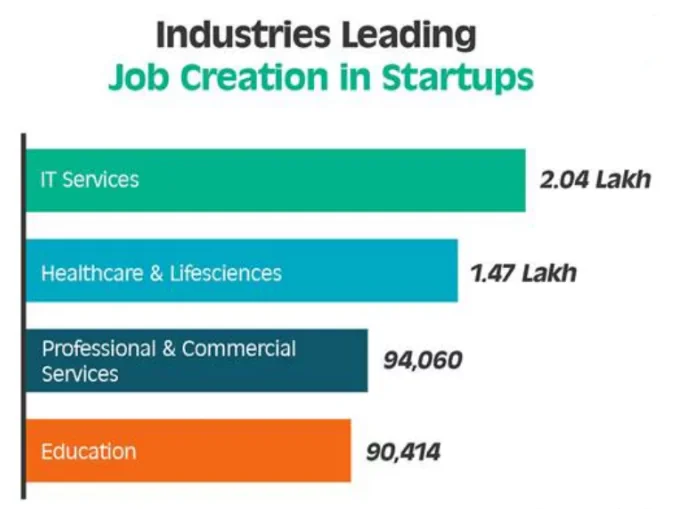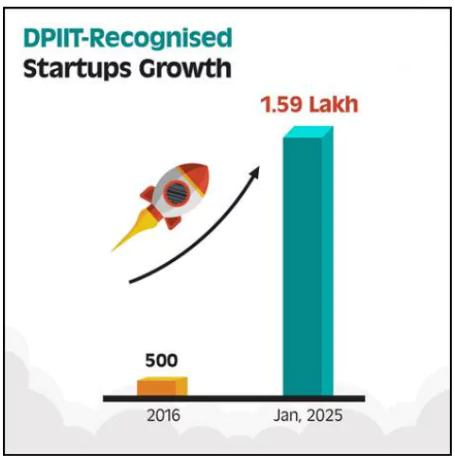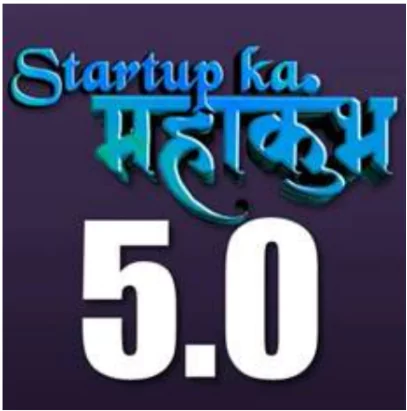
On January 16, 2025, India marks nine years of Startup India Program, a transformative journey that began in 2016. January 16 is designated as National Startup Day.
About Startup
- In India, A startup is defined as an entity that is headquartered in India, which was opened less than 10 years ago, and has an annual turnover less than ₹100 crore.
- Exclusions: Entities formed by splitting/reconstruction of existing businesses are not considered startups.
Enroll now for UPSC Online Course
Terms Related to Startup Valuations
- Unicorn: A unicorn is a startup that has a valuation of over $1 billion. The term was coined by Aileen Lee in 2013.
- Decacorn: A decacorn refers to a startup with a valuation exceeding $10 billion. These companies are less common than unicorns and represent startups that have achieved significant growth and market dominance.
- Hectocorn: A hectocorn is an extremely rare and prestigious term used to describe startups with a valuation of over $100 billion.
- Mincorn: A mincorn is a less commonly used term that refers to startups valued at less than $1 billion.
- Soonicorn: A Soonicorn refers to a startup that is rapidly growing and has the potential to reach a valuation of $1 Bn in the near future.
|
Present Status of Startups in India

- India now ranks as the third-largest startup hub in the world, with over 100 unicorns, following the United States and China, and is followed by the UK and Germany.
- Total Startups: DPIIT-recognized startups grew from 500 in 2016 to 1,59,157 as of January 15, 2025.
- Women-Led Startups: 73,151 startups include at least one woman director (as of October 31, 2024).
- 48% of startups (55,816 out of 1,17,254) had at least one woman director by December 2023.
- Employment Generation: Startups created 16.6 lakh direct jobs between 2016 and October 31, 2024.Emergence in Tier 2 and 3 Cities: Over 50% of startups emerged from tier 2 and 3 cities as of December 2023.

About Startup Mahakumbh
- Startup Mahakumbh is a flagship event bringing together startups, unicorns, soonicorns, investors, industry leaders, and ecosystem stakeholders.
- First Edition (2019): Over 500 startups, investors, and industry leaders participated.
- Upcoming Edition: The fifth edition is scheduled for March 7-8, 2025, in New Delhi.
|
Reason why India’s Startup Sector is Booming
- Supportive Government Policies: The Startup India Initiative has been instrumental in creating a robust ecosystem by providing tax benefits, easing compliance, and offering funding support like the Fund of Funds for Startups (FFS) with a corpus of ₹10,000 crore.
- Over 1.52 lakh startups have been recognized by DPIIT, contributing significantly to job creation and innovation.
- Expanding Digital Infrastructure: Initiatives like Digital India and the adoption of the Unified Payments Interface (UPI), which saw transactions exceeding ₹20 lakh crore in 2024, have provided a seamless digital backbone.
- India boasts the world’s lowest data costs at ₹6.7 per GB in 2023, enabling startups to reach a vast audience.
- Large Consumer Market: India’s demographic dividend of 65% of the population under 35 years offers a significant consumer base for startups.
- The e-commerce sector alone is projected to be worth $188 billion by 2025.
- Thriving Talent Pool: With over 1.5 million engineering graduates annually, and policies like the National Education Policy 2020 emphasizing entrepreneurship, India provides a strong pipeline of skilled professionals.
- Venture Capital and Funding Resilience: Despite global economic uncertainties, India’s tech startups raised $4.1 billion in H1 2024, making it the fourth-highest funded ecosystem globally.
- Domestic venture capital and accelerator programs like Microsoft Ventures Accelerator and SAMRIDH provide startups with mentorship and funding.
- Emergence of Tier-2 and Tier-3 Cities: Nearly 50 per cent of the country’s startups originate from Tier II and Tier III cities, including emerging hubs like Indore, Jaipur, and Ahmedabad.
- Regional policies and incentives are encouraging innovation beyond metro hubs, creating decentralized startup ecosystems.
Check Out UPSC CSE Books From PW Store
Government Initiatives to Promote Startups in India
- About Startup India Programme
- Launched by the Department for Promotion of Industry and Internal Trade (DPIIT) on 16th January, 2016,
- It is rolled out several programs with the objective of supporting entrepreneurs, building a robust startup ecosystem and transforming India into a country of job creators instead of job seekers.
- Flagship Schemes Implemented Under Startup India
- Startup India Seed Fund Scheme (SISFS), 2021: Provides financial assistance to early-stage startups in India.
- Credit Guarantee Scheme for Startups (CGSS), 2022: Provide collateral-free funding to startups through credit guarantees for loans extended by Scheduled Commercial Banks, NBFCs, and SEBI-registered AIFs.
- Fund of Funds for Startups (FFS) Scheme, 2016: Established with a corpus of Rs 10,000 crore to provide funding support to startups through venture capitalists.
- As of 2024, ₹7,980 crore has been committed to 99 Alternative Investment Funds (AIFs).
- BHASKAR (Bharat Startup Knowledge Access Registry) 2024: To centralize and streamline interactions within India’s entrepreneurial ecosystem.
- To foster innovation, collaboration, and growth for startups.
- Prime Minister’s Employment Generation Programme (PMEGP):
- Lunched by: Ministry of Micro, Small & Medium Enterprises (MSME)
- Subsidy: 25% in rural areas, 15% in urban areas; higher for SC/ST/OBC/Women (35% rural, 25% urban).
- Assisted 9.69 lakh micro-enterprises since 2008-09, generating ~79 lakh jobs.
- Second loan scheme for expansion: ₹1 crore in manufacturing, ₹25 lakh in services.
- Startup Village Entrepreneurship Program (SVEP):
- Sub-component of DAY-NRLM (Deendayal Antyodaya Yojana – National Rural Livelihood Mission) by Ministry of Rural Development (MoRD)
- Supported 3,02,825 enterprises, creating 6,26,848 jobs.
- TIDE 2.0 (Technology Incubation and Development of Entrepreneurs) (MeitY):
- Focus on emerging tech: AI, IoT, Blockchain.
- 51 incubators established; 1235 startups supported.
- GENESIS (Gen-Next Support for Innovative Startups) (MeitY):
- ₹490 crore outlay for 5 years; supports 1500+ startups in Tier-II and Tier-III cities.
- Atal Innovation Mission (AIM): Under NITI Aayog, AIM establishes Atal Incubation Centers (AICs) to provide physical infrastructure and support to startups.
Challenges to the Growth of Startups in India
- Regulatory Hurdles: Complex compliance requirements and regulatory ambiguities create barriers.
- For instance, debates over the classification of app-based cab services (like Ola and Uber) under the Motor Vehicles Act have led to operational uncertainties.
- Digital Personal Data Protection Act, 2024, though necessary, adds compliance burdens for startups handling user data.
- Access to Funding: Funding remains concentrated in select regions and sectors, leaving startups in Tier-2 and Tier-3 cities underfunded.
- Only 149 women-led startups have received funding under government schemes like AIFs, highlighting a disparity.
- Global economic uncertainties, such as the funding slowdown in 2023, have also impacted capital availability.
- Talent Retention: Startups face stiff competition from established corporations and international opportunities, leading to a brain drain.
- A 2023 study showed that 60% of Indian tech professionals were willing to relocate abroad.
- Challenges in offering competitive salaries and growth opportunities further exacerbate this issue.
- Market Saturation and Hyper-Competition: Sectors like edtech and e-commerce are highly crowded, reducing profit margins and creating unsustainable cash burn scenarios.
- Companies like BYJU’s and Unacademy have had to downsize significantly due to oversaturation
- Infrastructure Gaps: Internet penetration in rural areas is only 37%, compared to 69% in urban areas, limiting the market reach of digital startups.
- Startups focused on agritech or rural services, like DeHaat, struggle to scale due to limited infrastructure and connectivity.
- Limited Geographical Spread: India has three main startup clusters—Bengaluru, Delhi National Capital Region (NCR), and Mumbai.
- Bengaluru, also known as India’s Silicon Valley, is India’s top city for high-growth startups, with over 40% of the country’s unicorns.
- Low R&D and Deep Tech Innovation: India’s R&D spending is only 0.7% of GDP, compared to 3.5% in the US. This restricts the growth of deep-tech startups in fields like semiconductors and biotechnology.
- Weak industry-academia collaboration further hampers innovation, with less than 1% of higher education institutions actively involved in research.
- Scaling Challenges: Around 90% of startups fail within the first five years due to operational inefficiencies and an inability to scale.
- The lack of experience in navigating growth phases, coupled with limited mentorship and market access, compounds these issues.
Way Forward to Boost Startup Ecosystem in India
- Streamlined Regulations and Compliance: Simplify tax and labor compliance for startups across sectors.
- Expand regulatory sandboxes to sectors like edtech, healthtech, and cleantech to encourage innovation in a controlled environment.
- Enhanced Access to Funding: Strengthen domestic venture capital funds and incentivize private investments in startups.
- Provide targeted funding support for Tier-2 and Tier-3 city startups and women-led ventures.
- Fostering Industry-Academia Collaboration: Promote joint R&D projects between startups and academic institutions.
- Establish sector-specific research and innovation hubs to nurture deep-tech startups.
- Digital and Physical Infrastructure Development: Bridge the urban-rural digital divide to enable startups in agritech and rural sectors.
- Develop dedicated startup hubs in emerging cities with incubators, coworking spaces, and mentorship support.
- Skill Development and Entrepreneurship Education: Integrate entrepreneurship training in higher education curricula through the National Education Policy (NEP).
- Conduct targeted skill development programs focusing on AI, IoT, blockchain, and clean technologies.
- Government Procurement and Market Access: Mandate a percentage of government procurement for startups, similar to MSME policies.
- Expand international startup bridges and collaborations for global market access and funding.
Enroll now for UPSC Online Classes
Conclusion
India is poised to emerge as a global leader in the startup ecosystem, driven by favorable policies, a culture of innovation, and cross-sector collaboration. As the nation envisions Viksit Bharat by 2047, startups will be instrumental in fostering economic growth, generating employment, and establishing India as an innovation hub.
![]() 16 Jan 2025
16 Jan 2025



